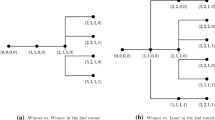Abstract
We study an elimination tournament with heterogenous contestants whose ability is common-knowledge. Each pair-wise match is modeled as an all-pay auction. Equilibrium efforts are in mixed strategies, yielding complex dynamics: endogenous win probabilities in each match depend on other matches’ outcome through the identity of the expected opponent in the next round. The designer seeds competitors according to their ranks. For tournaments with four players we find optimal seedings for three different criteria: (1) maximization of total tournament effort; (2) maximization of the probability of a final among the two top ranked teams; (3) maximization of the win probability for the top player. We also find the seedings ensuring that higher ranked players have a higher winning probability. We compare our predictions with data from NCAA basketball tournaments.
Similar content being viewed by others
References
Baye, M., Kovenock, D., de Vries, C.: Rigging the lobbying process. Am Econ Rev 83, 289–294 (1993)
Baye, M., Kovenock, D., de Vries, C.: The all-pay auction with complete information. Econ Theory 8, 291–305 (1996)
Chan, W., Courty, P., Li, H.: Suspense. CEPR discussion paper No. 3251 (2007)
David, H.: Tournaments and paired comparisons. Biometrika 46, 139–149 (1959)
Glenn, W.: A comparison of the effectiveness of tournaments. Biometrika 47, 253–262 (1960)
Gradstein, M., Konrad, K.: Orchestrating rent seeking contests. Econ J 109, 536–545 (1999)
Hillman, A., Riley, J.: Politically contestable rents and transfers. Econ Polit 1, 17–40 (1989)
Horen, J., Riezman, R.: Comparing draws for single elimination tournaments. Oper Res 3(2), 249–262 (1985)
Hwang, F.: New concepts in seeding knockout tournaments. Am Math Mon 89, 235–239 (1982)
Klaassen, F., Magnus, J.: Forecasting the winner of a tennis match. Eur J Oper Res 148, 257–267 (2003)
Klumpp, T., Polborn, M.K.: Primaries and the new hampshire effect. J Public Econ 90, 1073–1114 (2006)
Konrad, K.: Bidding in hierarchies. Eur Econ Rev 48, 1301–1308 (2004)
Rosen, S.: Prizes and incentives in elimination tournaments. Am Econ Rev 74, 701–715 (1986)
Searles, D.: On the probability of winning with different tournament procedures. J Am Stat Assoc 58, 1064–1081 (1963)
Schwenk, A.: What is the correct way to seed a knockout tournament. Am Math Mon 107, 140–150 (2000)
USA Today: Weighted brackets in NCAA draw fire. March 26 (2003)
Warneryd, K.: Distributional conflict and jurisdictional organization. J Public Econ 69, 435–450 (1998)
Author information
Authors and Affiliations
Corresponding author
Additional information
We wish to thank Alex Ilek, Mike Baye, Dan Kovenock and two anonymous referees for very helpful comments.
Rights and permissions
About this article
Cite this article
Groh, C., Moldovanu, B., Sela, A. et al. Optimal seedings in elimination tournaments. Econ Theory 49, 59–80 (2012). https://doi.org/10.1007/s00199-008-0356-6
Received:
Accepted:
Published:
Issue Date:
DOI: https://doi.org/10.1007/s00199-008-0356-6




